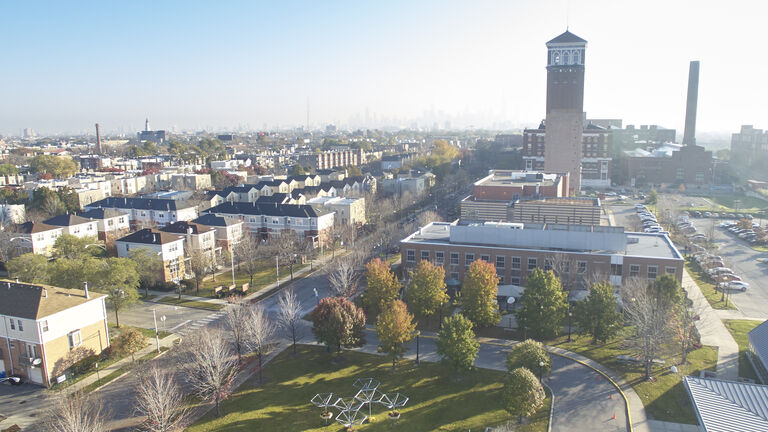
credit: Tom Harris Photography
Degree Classes
School of the Art Institute of Chicago (SAIC) students have various opportunities to get involved at Homan Square. Students have engaged actively with the Homan Square community since its launch. Student groups have organized festivals, film screenings, tree plantings, and conducted walkability research and discussions at Nichols Tower in Homan Square. In addition to events, degree-seeking students from SAIC can also take courses taught at Homan Square.
Fall and Spring Courses
ReMaterials at Homan Square
AIA and Designed Objects
Instructor: Odile Compagnon
Spring 2025
In this course we focus on a participatory placemaking project in North Lawndale where community members and student artists gain skills in natural building techniques with cob, straw-bale, willow, rammed earth, hemp, and brick. The studio works within the constraints of the local conditions to determine material specification, use, reuse, and recycling or upcycling options available for on-site construction. Co-creation activities are at the heart of the design and building process, which requires a detailed understanding of the unique capacities of the community with which the students collaborate.
Contact: ocompagnon@saic.edu
Environmental Justice
Liberal Studies
Instructor: Alex Williams
Spring 2025
In this course, students will engage with theoretical and historical perspectives of environmental inequalities on a global and regional scale. The course examines community responses and policy solutions to environmental problems, particularly at the intersection of environmental quality and public health and race, gender, and class inequities. We also discuss environmentalism amid colonial and capitalist power structures. Lawndale and Little Village, two Chicago communities with rich histories of environmental activism, serve as local case studies. The readings for this course include works from Rachel Stein, who writes on environmental activism and gender; Anna Tsing, an anthropologist concerned with human/nature interactions at the edges of global capitalism; Robert Brulle, a scholar/activist writing on current environmental movements; Kyle Whyte, who writes from an indigenous perspective on the relationships of indigenous peoples and climate activism. We will also review policy papers from the National Resource Defense Council and other advocacy groups.
Contact: awilliams71@saic.edu
Social Engagement Studio
Design Objects
Instructor: Eric Hotchkiss
Fall & Spring semesters
Social Engagement Studio combines professional practice design experience with community activism. Operating out of SAIC's facility in the Nichols Tower at Homan Square, the course engages students in a focused dialogue on social project implementation in Chicago and provides the tools and frameworks to realize those projects. Functioning as a pro bono "design consultancy" where the residents, small businesses, and community groups of North Lawndale act as "clients," each job is treated as a discrete project involving research, knowledge-sharing, and design action.
Contact: ehotch@artic.edu
Classes are subject to change.
Past Classes
Ecology of Contested Space
Instructor: Charles Corwin
Amid global environmental and political turmoil and local grassroots activism, we will traverse regenerative urban spaces with different organizational frameworks and ideas about what it means to be with others and what it means to include the non-human. This course explores these new modes of being, with fellow humans and among other species and things, in a changing world. The course is structured around critical readings, as well as community-based projects in North Lawndale.
Community Practice and Helping Relationships
Instructors: Leah Ra’Chel Gipson, Pascale Ife Williams
This multi-level course draws from arts and counseling perspectives to critically examine helping relationships, community care work, socially engaged art practice, cultural curation, and research through service learning. Students will learn various models of collaboration with community members and an interdisciplinary team of mental health practitioners, artists, designers, organizers, educators, scholars and researchers.